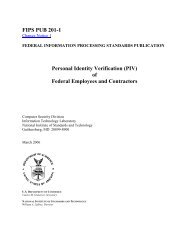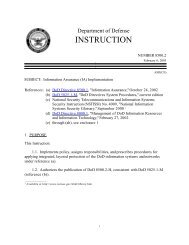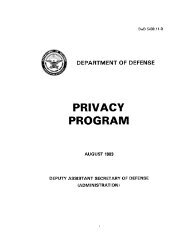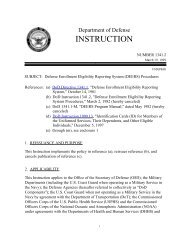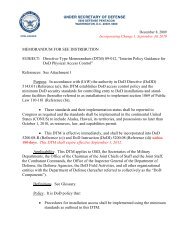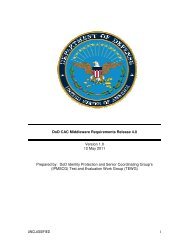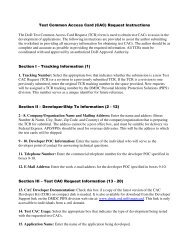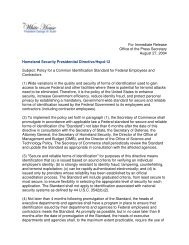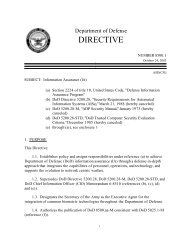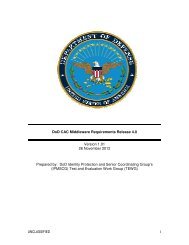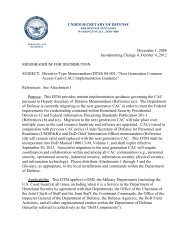DoD Instruction 8520.2, April 1, 2004 - Common Access Card (CAC)
DoD Instruction 8520.2, April 1, 2004 - Common Access Card (CAC)
DoD Instruction 8520.2, April 1, 2004 - Common Access Card (CAC)
Create successful ePaper yourself
Turn your PDF publications into a flip-book with our unique Google optimized e-Paper software.
DODI <strong>8520.2</strong>, <strong>April</strong> 1, <strong>2004</strong><br />
E3.4.1. Identity. Networks and web servers accessed by <strong>DoD</strong> eligible users and<br />
<strong>DoD</strong> Partners shall be enabled to use certificates for authenticating users and to support<br />
access control decisions. Web servers protecting access to personal information for<br />
information-privileged individuals, volunteers, and Reservists do not require client<br />
certificate authentication, but shall at a minimum require userid and password-based<br />
authentication. Other information systems shall consider the use of certificates for<br />
authenticating users.<br />
E3.4.1.1. Network Login. All <strong>DoD</strong> networks required by reference (a) to<br />
authenticate users shall perform this authentication using certificates issued by the <strong>DoD</strong><br />
PKI on hardware tokens (e.g., the <strong>CAC</strong> or an equivalent assurance level <strong>DoD</strong> PKI token).<br />
E3.4.1.2. Web Server Authentication. <strong>DoD</strong> private web servers providing<br />
access to <strong>DoD</strong> sensitive information except those protecting access to personal<br />
information by information-privileged individuals shall be PK-Enabled to rely on<br />
certificates for client authentication issued by <strong>DoD</strong>-approved PKIs. Information<br />
systems residing behind web servers requiring authorization based on individual identity<br />
shall use the identity provided by certificate-based authentication to support access<br />
control decisions.<br />
E3.4.1.3. Other Information Systems. For information systems requiring<br />
authentication other than network login or web servers, the system owner shall perform a<br />
business case analysis to determine if PK-Enabling is warranted. The business case<br />
analysis shall be submitted to the <strong>DoD</strong> Component CIO for review and approval. If<br />
warranted, the information system shall be PK-Enabled.<br />
E3.4.2. Digital Signature. PKI provides the capability to implement digital<br />
signatures and can be an important enabling tool to comply with Federal regulations,<br />
such as the Government Paperwork Elimination Act (reference (s)) and the Electronic<br />
Signatures in Global and National Commerce Act (reference (t)). If an information<br />
system uses PKI for digital signatures then that system shall follow ASD(NII) guidelines<br />
for digital signature requirements and Department-wide interoperability, and other<br />
requirements in this <strong>Instruction</strong> for PK-Enabling and interoperability.<br />
E3.4.2.1. E-mail. All <strong>DoD</strong> e-mail systems shall support sending and receiving<br />
e-mail signed by <strong>DoD</strong>-approved certificates. E-mail requiring data integrity, message<br />
authenticity, or nonrepudiation of <strong>DoD</strong> sensitive information, other than personal<br />
information sent by information-privileged individuals, volunteers, or Reservists, shall<br />
be signed using <strong>DoD</strong>-approved certificates.<br />
18 ENCLOSURE 3



